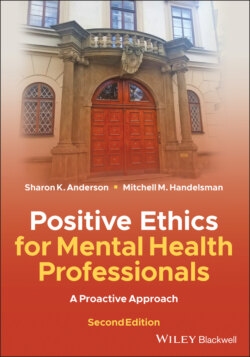Читать книгу Positive Ethics for Mental Health Professionals - Sharon K. Anderson - Страница 11
Developing and Exploring Your Moral and Professional/Ethical Identity
ОглавлениеNo matter where we are in our career and our development, we can uncover, explore, and articulate deeper aspects of our being … the core of our identity. Our core includes our motivations, needs, values, emotions, social identities, and personal morals (Anderson, 2015; Blasi, 1984).
Our professional/ethical identities likely develop out of our core in a cyclical (spiral!) fashion rather than in a straight line. We discover parts of our core identity, and that influences how we view the profession’s culture and our commitment to ethics. In turn, the experience of our profession’s ethics and culture influences who we are at our core.
Sharon recalls two examples that highlight this spiral of personal and professional influence:
Many years ago an advisee scheduled an appointment with me. I thought our discussion would be about her upcoming classes. I was very wrong: She came into my office and announced she no longer saw herself fitting well with the counseling profession’s ethical culture—she was going to pursue a different career where her personal values and ethics were a better match with the profession. Through exploring what was in her core, she was clear that some of her personal values were non-negotiable. She was very committed to some of her personal values and morals and didn’t know how she would keep those from being part of her work. For example, she didn’t agree with abortion and knew that as a high school counselor this might be a frequent topic of discussion. She didn’t want to give up her values or lay them off to the side while working with people. She didn’t want to impose them either. Her personal ethics were naturally influencing her professional/ethical identity.
Another example was where professional ethics influenced a change in the personal. In class, a student shared his recent conversation with family members about his work with some students on campus. He kept his comments to his family at a vague level. His understanding and sensitivity to confidentiality had been heightened due to the recent and ongoing conversations about confidentiality in the ethics class. As a family member pressed for more detail about his work, he stood his ground, letting his family member know that, although he recognized the importance of open communication with them, which continued to be his value, he also had begun to incorporate an aspect of his professional self—he had recognized his ethical obligation to honor the privacy of those he served on campus. From this experience he began to think more about how conversations with family members about other family members may need to change to honor his values of confidentiality and privacy.
Our professional/ethical identities evolve over time, but no matter where we are, we can improve our understanding and exploration of the core elements of our identities. The benefits of having a well-thought-out and well-articulated professional/ethical identity include providing better psychotherapy and counseling to clients, preventing burnout, and experiencing a more fulfilling and productive career.
